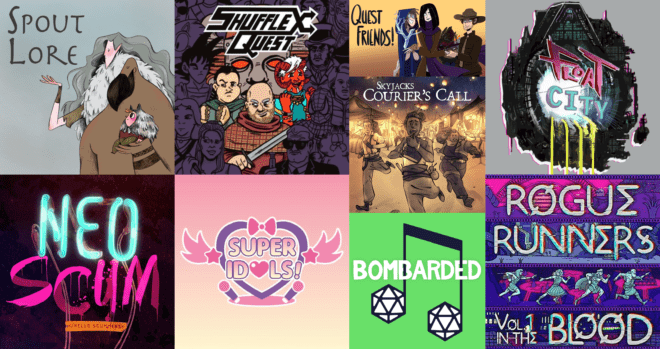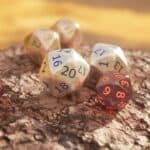The 21 Best Actual Play Podcasts

Last updated on January 12th, 2022
Spout Lore
The first of our new actual play podcasts on the list, Spout Lore follows the adventure of Tuk the Barbarian, Ving the Half Elf Druid and Billy the halfling thief boy using the Dungeon World system. In a world that lost all of its magic a century ago, the trio finds themselves drawn into various different situations involving the lingering remnants of magic left. Ultimately, the party is driven by their needs to help their friends, each other, and learn more about themselves. The show is hilarious, and the world building is phenomenal. The “Yes, And” approach to on the spot world building often leads to unexpected scenarios as the cast unravels their previously established lore to create compelling and complicated situations. If you want to get a taste for the show, their website has a selection of different fan-favorite clips, so try out a sample before you dive into it!
Read more: How Friends At The Table Spreads Around Authorship
Skyjacks Courier’s Call
(Disclosure: I was a backer of the Kickstarter campaigns for both seasons.)
Campaign Skyjacks has put an impressive amount of work into building their folkpunk world of sky pirates and weird magic, so a spinoff set in a different part of the world was a no brainer. Enter Courier’s Call, a kid-friendly glimpse into the world of Spire following the adventures of June, Cici, and Kiran as they train to become mail couriers. The show focuses on the flying mail ships manned mostly by teens, going from town to town delivering and collecting mail. They do an amazing job keeping the same energy as Skyjacks without some of the dirtier aspects. That being said, they aren’t afraid to address heavier material, in a way that kids would be able to process. The stakes still feel just as high, but from the perspective of a group of children. Even though the cast of characters don’t have as many supernaturally high stakes going on as the main show’s crew, these kids feel fully realized. If you’re looking for actual play podcasts for the whole family, you would be hard pressed to find a better example than Courier’s Call.
Shuffle Quest
Created by some of the minds that would later go on to host the podcast about pop culture and stolen labor Anime Sickos, Shuffle Quest follows the adventures of a Dungeons & Dragons adventuring party recruited by the interdimensional being Olmec (yes, that Olmec) to travel to different pop culture worlds to save them from a universe destroying threat. The main gimmick of the show is that, when the crew travels to a new world, their character sheets are adapted to whatever official game system the brand has put out. From the worlds of Men in Black to Dragon Ball Z to Sonic The Hedgehog, there is a clear understanding of each world. However, there isn’t a reverent blind respect for the world. If there is something about a world that sucks in a way that the official material doesn’t really explore, the show often dives right into it. For example, the main hook of the Dragon Ball Z world is that death doesn’t really matter since everyone can just be wished back by Dragon Balls and you don’t really matter if you can’t shoot beams from your hands. If you want to listen to a show that’s kind of like a more messed up version of Kingdom Hearts, check out this show!
bomBARDed
bomBARDed follows the musical adventures of Chaos Sauce, a band full of multiclassing bards studying at the magical Strumlott’s School for Bards. Along the way they discover complex conspiracies, accidently time travel, learn more about their mysterious magical instruments, and eat snacks. The cast is made up of the members of real-life band LINDBY. The main hook of the show is that, once per episode, the band runs into a problem or situation where the only way through is to write an original song. They roll dice to determine cords, styles, and other factors and come back with a new song. It’s a delightful show with a fun, Adventure Time-like vibe with a reliable format that still finds ways to surprise you.
Quest Friends!
Quest Friends! follows the adventures of four strangers trying to undo a mistake of theirs that unleashed a cloud of world-ending spiders. The player characters are fully fleshed out and delightful, and the NPCs are as unique as they are lovable. The story is told using the strange and delightful Numenera system, a future fantasy game system designed to make things get weird. The show surprises listeners with new twists and circumstances at every turn. It can range from a daring robot heist to a Mario Kart tournament for justice to a murder mystery dating sim that’s also prom. This is also the most found family actual play podcast I have ever listened to, and that says something given actual play podcasts almost exclusively made up of found family stories.
Read more: Quest Friends! Concludes its Emotional and Endearing First Campaign
Superidols RPG
Superidols! RPG is a Masks: A New Generation actual play podcast that takes its influences from magic girl pop idol anime. The show follows the adventures of the Fort McNally Idol Club (AKA RhythMixx), a super-powered teen idol club trying to achieve fame in an idol centric world. The home-brewed mechanics make magical performances feel just as thrilling and dangerous as combat while keeping the music concert flair. The show also doesn’t shy away from the mundanity of being in a band together or putting in the effort to rehearse for performances. The large cast means an exploration of the variety of books in Masks, showing what a pop idol version of that type of character would look like, such as the Doomed being involved in an evil record company deal or the Janus being in a Hannah Montana situation. If you’re looking for a different kind of super powered teens story in your actual play podcasts lineup, grab your ticket to RhythMixx’s next show!
Fun City
Fun City is an cyberpunk Shadowrun podcast set in a post climate change ravaged New York City. The show is a fun mix of charismatic player characters, hysterical and intense situations, and the unavoidable damage of unregulated capitalism to the natural world. The dual game master system is inspired, with one GM, Mike Rugnetta, focused on world building and general GM business while having a second person, Taylor Moore, play any major villains or other NPCs. Moore’s take on the NPCs he’s thrown range from “the goofiest little guys” to “horrifying creatures with even more horrifying implications.” The show recently concluded its “Float City” pandemic campaign, set 100,000,000 years in the future, and is an absolutely riveting weird future science fiction tale. If you want to take a look at the show’s style in a complete package, I recommend starting there.
Rogue Runners
Rogue Runners follows the vein of shows like 20 Sided Stories or Shuffle Quest, adapting other media into compelling actual play campaigns. For their first season, they covered Supergiant’s Hades, the award winning rogue runner about escaping from Hell and dealing with daddy issues in a world of Greek mythology. Four shades of the underworld must work together to escape Hades in order to get a second chance at life. Between a chaotic rogue, a bard that trained under Orpheus, a Nordic sorcerer in the wrong mythology and Alexander The Great, the “working together” part might be a big ask. While the show understandably hasn’t adapted any other rogue runners yet, being a new show and all, the amount of care and attention to detail put into replicating the feel of Hades is astounding. It feels like a natural continuation of the story from the game, expanding in ways you would expect a Hades sequel to expand. The work put into the mechanics of play are also impressive, converting the familiar rules of D&D into a homebrew that tackles the rules of a run of Hades. I’m looking forward to future volumes set in Hades, as well as seeing how the show adapts to other rogue runners with the same amount of care.
Neoscum
Neoscum is an intense and hysterical Shadowrun show following the Neoscum shadowrunners as they embark on a cross country roadtrip across a cyberpunk capitalist dystopian America has evolved into. Four years of podcasting cover a few weeks of an intense journey, letting the cast really get into dealing with whatever issues each location or trip provides. The chemistry of the cast is amazing, with every conversation and riff just dripping with charisma. The editing in Neoscum is also some of the best in the business. Like just about all actual play podcasts ever, the editing in the early episodes is rough (and can be skipped thanks to some well-made arc recap episodes the show has put out.) The gradual glow up that the editing has is outstanding, especially with the steller music cues once the show gained access to HoZac Records’s music library. You owe it to yourself to start listening to Neoscum and fall in love with these characters.
Bonus Actual Play Podcasts
These actual play podcasts appeared in earlier versions of this list. Be sure to give them a listen too!
Dungeons and Daddies
One of the most satisfying things to any actual play show is watching the players deconstruct whatever the DM had planned through some weird rule they accidentally stumbled upon. These moments can range from epic to hysterical, often times being a little bit of both. All that matters is that the game master is flexible when these moments come up. GM Anthony Burch is flexible, but I’d understand if that flexibility is straining. The cast finds every nook and cranny they can in the game rules and the abilities they have to send the story in some wild places.
Campaign Skyjacks
One of the best arcs of Campaign’s Star Wars series was spent at a bounty hunter convention. It was supposed to be a small arc, but the show wound up spending over a year exploring this specific setting. Skyjacks, however, is a different show that has learned from the past, and when they came to a new location with an event going on (big bird contest), they merely spent half a year there and counting (in the most recent episode, they started making the motions of leaving, but I get the feeling it’ll be a bit of an Irish Goodbye*). It is so much fun watching the cast worldbuild through riffing and encouraging complication. It’s wonderful to watch this weird-sky-pirate-magic world develop and I look forward to seeing where things go in the coming year.
*As in a goodbye that takes a long time. I know it popularly means leaving without saying anything, but as someone raised first-generation Irish, trust me when I say the Irish take about two full drinks to leave a party. I will not budge one this and nobody is asking me to.
Rude Tales of Magic
The frustrating thing about this show is that it feels like a group of comedians got together and said, “Hey, what if we made a great D&D podcast?” and then did that. “Rude” is the best way to describe everything in this show. Nothing is scary, nothing is evil, nothing is malicious, everything is just rude. Branson Reese isn’t afraid to let the world of Cordelia become impractical and comedically horrifying whenever possible, somehow landing on the funniest characterizations for every NPC necessary. The player characters are well-defined pretty early on, which is an impressive thing for actual play podcasts. I’d like to give a special shout-out to Tim Platt‘s Stirfry, a Kenku cook for Christopher Hastings‘ s skeletal Frederick de Bonesby. Stirfry is my favorite character in that way where he is comedically annoying and you want to hate him, but it slowly dawns on you that he has regrettably become your favorite character, like Zoidberg from Futurama or a better executed Claptrap from Borderlands. I know this doesn’t sound positive, but Platt’s performance is what really brings the characters together.
The End of Time and Other Bothers
I learned this year that The End of Time and Other Bothers is a Dungeon World podcast. The only reason I didn’t know this from the start is that the show doesn’t really care about following the rules of the game. It’s more of an improvised story that rolls when needed to advance plot points or randomize a consequence. Sean Howard creates a world and lets the players explore it, forming the story around them even if they might not be following along a predetermined path. There is a rule in improv to follow the joy of a scene to find what’s funny, and this has lead to several episodes dedicated to hilarious scenes prompted by the characters. A notable example of this was a recent snake oil selling episode with chaotically magical results.
Very Random Encounters
In a year full of long-running campaigns coming to a close, there is something refreshing about Very Random Encounters short seasons of complete stories. This year saw the end of the 80’s kids movie Tales From the Loop season run by Greg, an epic fantasy Fellowship season run by Wheels, and a bunch of little critters trying to make it in the middle of a war in Root run by Logan Jenkins. The randomization is done at a macro level with major plot points and character creation, allowing listeners to watch these moving stories get molded by the cast using the parts provided to them.
Join the Party
Join The Party ended their first full campaign this year. The Party Campaign was full of creative ideas and fun characters which ultimately told a story about identity. It’s one of the only actual play shows that offers episodes with D&D tutorials to help new listeners learn the rules of the game. The show has always felt cozy and the next season promises to build upon the momentum of the first.
The Adventure Zone
This year McElroys brought Amnesty, their Monster of the Week campaign, to an end. It also saw the beginning of Graduation, a third season DM’d by Travis bringing back D&D. While the system is familiar, they’ve chosen character classes and races that aren’t typically seen in actual play shows, leading to a more fantasy fairy-tale aesthetic. They’ve also begun releasing live shows that don’t involve the Tres Horny Boys of Balance fame (a name that must sound bonkers out of context). They’ve instead been doing different oneshots in different systems, which make the live shows more approachable to newcomers. A standout example of these episodes is Dadlands, guest DM’d by Brennan Lee Mulligan, offering a rare opportunity for all four family members to play together. Following the end of Graduation, the team should seriously look into having the fourth season DM’d by someone new to expand on this dynamic.
20 Sided Stories
The Pokemon campaign for 20 Sided Stories came to an end this year as The Dream Police, comprised of the go-getting Candace Carter, the enthusiastic Skip Svitak, and the reluctant Xander Whitten, complete the final gyms and learn the truth to the strange occurrence going on around Kanto. The show does an amazing job replicating the aesthetics of the series through music, sound effects, and even character dialogue. The ongoing mystery of the series is incredibly well done, with hints layered through the early episodes until things come to a head in a legendary fashion. The next season of the show premieres this year, set in the Marvel Cinematic Universe after the Snap.
Autonomic
Surely we will eventually hit the cap on “school of magically powered children” stories, but Autonomic is one of the best ones out there. Autonomic is a family-friendly actual play podcast show run by Kat Kuhl, the GM of the wonderful One Shot Campaign Star Wars series. The show takes place in the world of Respite and follows a group of young nomics, superpowered beings who each represent concepts. The former nomics all disappeared 12 years ago, and all of the new young nomics, on their shared 12th birthday, move to a new boarding school to learn how to work together and hone their powers to save the world.
The thing that excels this show to greatness is the emphasis on the “middle school” part of “super powered middle school.” The pre-teen kinda superheros that the story follows are the charismatic team leader type Maya played by Taylor B. Hill, the chaotic wild-hearted Izzy played by Liz Anderson, the brooding and dramatic Brennan played by Stephen Kropa, and optimistically curious Manik played by Pranks Paul. This show feels of burning through a fantasy novel in the school library during lunch. The recent episodes have followed the students on their first full day of school and I wouldn’t complain if this were the entire show. All of the child characters are played like actual middle schoolers, balancing the genuine stress of middle school alongside the magical circumstances.
The show also keeps its family friendly tone in mind in every aspect. Every show should have trigger warnings in general, but Kuel takes an extra step. At the beginning of every episode, as one of the teacher NPCs, she explains any potentially complex ideas that might come up in the episode. These can range from “what to do when a friend is having a panic attack” to “sometimes four adults can’t solve a math problem.”
Critical Bits
Critical Bits chronicles the adventures of The Fun Bunch, a group of teen superheroes fighting to defend the city of Heavendale against the forces of evil. The cast includes Shelby Lee’s Alex, a happy-go-anxiety non-powered superhero named Ace trying to do good, Paul Byron’s Gerry, Alex’s drug dealing stoner best friend with the ability to nullify powers who also just has terrible luck, and Shannon Strucci’s Kim, a former “crime orphan” with metal manipulation powers looking for redemption from a life of crime.
On their own, these three characters could be the stars of a good high school superhero story. It is the special sauce of Joel Ruiz’s game running that turns this show into something truly special. Joel crafts a world full of superheroes that is comedically terrifying. There is a flesh maze made out of one boy. There is a super-villain/antihero who is the car from Herbie: Fully Loaded given life but desiring death. There is a villain called “Streak Shark” who is a naked shark with legs. Yes, sharks can be naked if they have human legs. The players “yes and” this world perfectly by playing all of this straight and adding to the ridiculousness on their own (notably Paul’s increasing development of the restaurants of Heavendale.)
The guest appearances on this show are also well done. Every guest character who shows up feels like they’re coming from their own series, making everything feel like a crossover episode. Some highlights include the murderously driven Hoagie Allin played by Branson Reese and Jodo, a recurring guest character played by a different player every time they appear (played by Brandon Leon-Gambetta in his first appearance and Maggie Mae Fish in her second.) The Critical Bits cast has also organized a few ambitious limited series events this year. A highlight of this is the 32-character 3 ½ hour Spider Day special based off of a riff in the main show, complete with a weekend-long charity stream. The team also premiered Seasons, a 6-part, 16-character Monster of the Week series.
Friends at the Table
This year, Friends At The Table brought their five year Seasons of Hieron series to an end. Ending an actual play series can be difficult, since it is hard to hit all of the points that would be satisfying for both the players and the audience. The randomness of rolls alone can make things difficult. That being said, the last in-game moment of the final episode of the campaign ends with a declarative mic-drop that naturally originated through player characterization and a small personal NPC reaction. The following epilogue was beautiful, but I wouldn’t have blamed them if they cut to black and rolled the credits.
There was clearly stuff that they were unable to touch upon in this third and final season, given how large the world they had developed became. They were even introducing new things about the world right up until the very end. The conclusions they do present range from bittersweet to open-ended, as is the FATT way. The world didn’t seem to end with their story, leaving listeners to think of the other fully fleshed out stories going on in this world after that final episode.
Spring in Hieron ended in September, and since then the show has been releasing previously Patreon exclusive episodes building upon their Divine Universe from their second and fourth seasons (counter/Weight and Twilight Mirage, respectively) leading to their sixth season, PARTIZAN, which promises to follow morally compromised characters dealing with the complexities of war. Friends at the Table remains one of those shows where I am elated when they drop a three hour episode, which is high praise for any podcast, let alone actual play podcasts.
Not Another D&D Podcast
A hillbilly high elf with a possum familiar, a barbarian who peaked in the fantasy equivalent of high school, and a halfling paladin teenage boy scout embark on a quest to save a world that has already been saved. The pitch alone for Not Another D&D Podcast sold me on the first few episodes, but the worldbuilding and character performances makes this one of the best actual play podcasts out there. Jake Hurwitz, Emily Axford and Caldwell Tanner have an amazing dynamic, always on the ball when it comes to portraying their characters honestly and hilariously.
2019 found The Band of Boobs leaving Bohemia to travel to different realms, from the Feywild to Shadowfell to Hell itself, with a stop to magic tournament in between. Brian Murphy is able to make every NPC immediately recognizable and memorable, never holding them to too high of status when the players begin making jokes at their expense. The cast also knows how to make things dramatic when they need to be dramatic without completely draining the energy out of the room.
The best thing I can tell you about this show is that the combat is fun to listen to, which is a hard thing to accomplish in a D&D show. Between the constant banter between characters and enemies, the pre-established in-jokes around moves and rolls, and Emily Axford’s epic musical scoring, the battles remain incredibly high energy even when counting up rolls.
While NADDPOD has had its fair share of great guest characters this year, the two in this year’s Shadowfell arc deserve special mention. Brennan Lee Mulligan’s Deadeye helped establish the dark setting the group was going to while entrenching himself into the lore of the overall story. The other guest character of that arc, Jveliin the dwarven barbarian, is a rare example of a guest character whose player is actually a spoiler.
If all of this wasn’t enough, the additional material posted by the podcast is impressive entertaining. The “Nannerfly Effect” live tour revisited critical moments of the campaign when a different roll would have drastically changed where the game was going. The mostly-monthly Trinyvale campaign DMed by Caldwell Tanner presents a more anime-fetch quest fantasy story (which feels like the show’s take on the setting from The Adventure Zone: Balance in a good way).













Comments
Comments are closed.